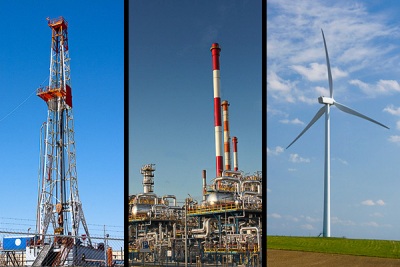Oct 30 2012
Scientists and politicians disagree on climate change or the best ways to get America energy independent, but one thing is clear: The United States and the rest of the world need more energy. Scientists project that by 2050, the world will consume double the energy it does today.
 Stanford scientists urge a balanced approach to meeting energy needs that includes natural gas, oil and wind power among other sources.
Stanford scientists urge a balanced approach to meeting energy needs that includes natural gas, oil and wind power among other sources.
Last week, a group of Stanford energy and climate experts said that instituting energy policies that wean us off fossil fuels and drive innovation in renewable energy is the best and most environmentally responsible way to meet this demand.
The discussion, titled "Energy Matters" and sponsored by the Stanford School of Earth Sciences and the Palo Alto Chapter of the League of Women Voters, covered the future of domestic and foreign energy production and consumption, and its impact on the climate and environment. It also weighed the merits of the energy policies put forth by President Barack Obama and Governor Mitt Romney.
By 2035, worldwide oil usage will have increased from 85 million barrels per day to 100 million (a figure that assumes oil-burning efficiencies yet to be deployed).
At the same time, conventional crude production is expected to decrease. We are approaching the "end of cheap oil," said Margot Gerritsen, director of the Institute for Computational and Mathematical Engineering at Stanford and an associate professor of energy resources engineering.
If we are to stay tied to oil, we will have to harvest non-conventional varieties, such as shale oil and oil sands, she said. Traditionally, these have been much more expensive to recover, and the process itself is very energy intensive. "One of the things we're trying to do at Stanford is help out with research to see if we can produce these in a slightly more environmentally friendly way," Gerritsen said.
Oil is just one piece of the energy puzzle, though, and a combination approach is needed to wean us off fossil fuels. Renewable sources such as wind, geothermal and solar have the potential to fulfill our energy needs.
In lieu of usable, and scalable, renewable options, natural gas could provide a bridge fuel to a greener future.
Using state-of-the-art technology and guarded by the proper regulation and policies, fracking – the controversial method of forcing natural gas out of the ground – could be done without health risks to people, said Mark Zoback, professor of geophysics. Scaled up, natural gas could provide an immediate and significant supplement to coal and oil in the United States, he said, and serve as a "bridge fuel" to cleaner energy technologies.
Such an investment in natural gas will only work if strong policies and regulations are in place. It also requires incentives to continue research and development into clean energy. After all, natural gas is only a bridge fuel if there's actually a renewable or green technology on the other end, said Ken Caldeira, a climate scientist in the Department of Global Ecology at the Carnegie Institution and a member of the Stanford environmental Earth system science faculty.
A big challenge facing green energy and climate remediation is convincing other countries, such as China, to get on board with clean energy. "We have a lot of technology, a lot of knowledge. We have to reach out and help," Gerritsen said, adding that this is one reason that the upcoming election, and the years of foreign energy policy that will result from it, is so important.
Better education stateside is also critical, said Sally Benson, director of Stanford's Global Climate and Energy Project. Americans need to better understand the science surrounding climate change and energy, and that starts by improving science and math education at the elementary school level, she said. Communication with the public needs to improve as well, she said, perhaps by personalizing abstract scientific concepts and environmental effects by connecting them to human health.
And what do the panelists think of the two candidates' energy policies? The panel as a whole lamented that neither candidate has been specific enough about his proposed energy policies, but they have said enough to make clear that they have contrasting plans.
Earlier in the evening, Caldeira said that part of scientists' role is to provide factual statements, which individuals can then apply their values to in order to make a decision. In that vein, he suggested Romney is the candidate for voters interested in getting America energy independent by exploiting domestic oil reserves. If, however, you are more interested in exploring a wider range of energy options, Obama is probably your candidate.
Gerritsen noted that Obama has pushed toward renewable energy sources and overall combination approach to energy policy would get her vote.
Zoback said that while the energy policies of the past four years have lacked cohesion, there has been a lot of movement in the right direction. "It would be unfortunate to lose that momentum," he said.
Benson closed the panel by saying that she is disappointed that neither candidate has really addressed climate change during the election run-up, and that the discussion on the topic has quieted to a whisper after some initial momentum. Regardless of who's elected, she said, Washington policy makers need to seriously discuss climate change and focus on correcting the problem.